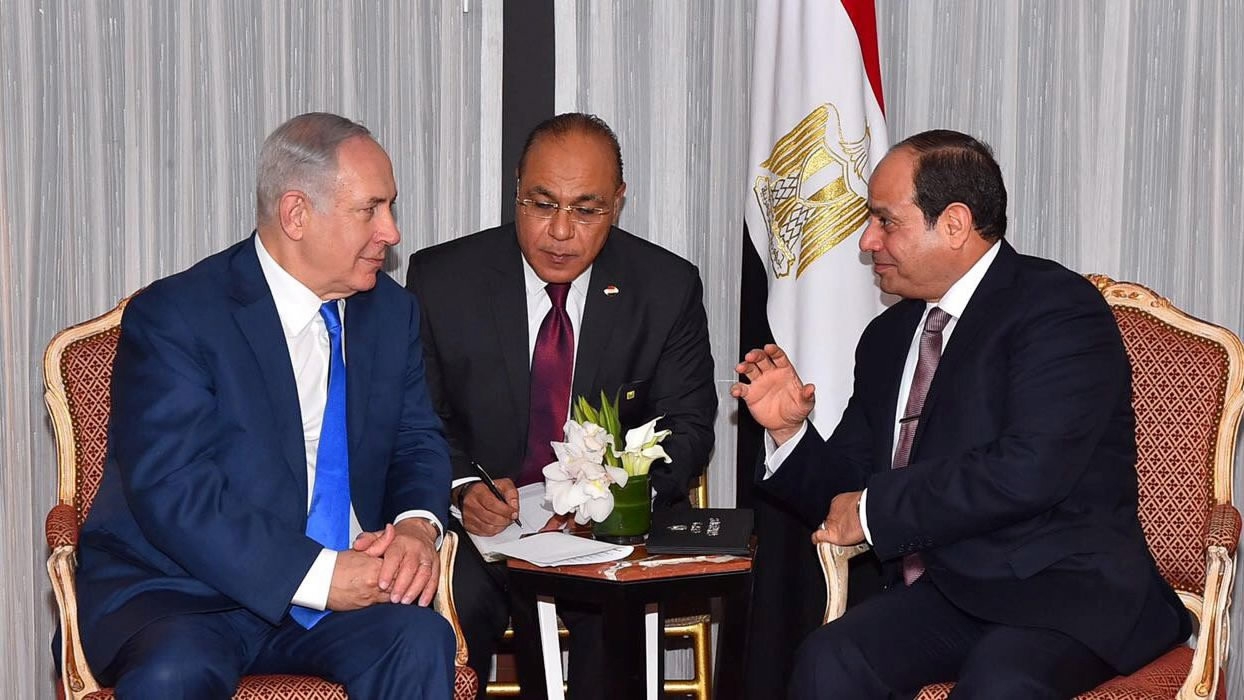In front of flashing cameras and rolling tapes, Egyptian President Abdel Fattah al-Sisi and Israeli Prime Minister Benjamin Netanyahu met on Monday night in New York where they were attending the 72nd session of the UN General Assembly. It was the first time their sit-down had been publicized as their previous meetings were kept under wraps.
Little has seeped out about what exactly was on the discussion table during their 90-minute talks – although, photos of the two were aplenty. But beyond the handshake, laughs and what looked like a friendly get-together, their meeting holds great political significance as both leaders have something to prove at home and abroad.

Egyptian President Abdel Fattah al-Sisi (R) speaks with Israeli Prime Minister
Benjamin Netanyahu (L) during their meeting in New York. /Egyptian Presidency Handout via Reuters
Egyptian President Abdel Fattah al-Sisi (R) speaks with Israeli Prime Minister
Benjamin Netanyahu (L) during their meeting in New York. /Egyptian Presidency Handout via Reuters
What was on the agenda?
The now-stalled peace process between Israel and Palestine were discussed during the Sisi-Netanyahu talks, although little details were provided.
The Israeli Prime Minister’s office released a statement on Tuesday saying that talks were “comprehensive” and tackled the “problems in the region,” without elaborating. It also noted that Sisi “expressed a willingness to assist the efforts towards peace between Israel and the Palestinians and in the region.”
Meanwhile, the spokesperson for the Egyptian presidency said Sisi emphasized that his government was seeking the resumption of talks to reach a “just and comprehensive” settlement to the Palestinian issue, in accordance with the two-state solution.
The last attempt for reconciliation between Israelis and Palestinians, which was initiated by the US, collapsed in April 2014. However, US President Donald Trump showed great optimism on Monday when meeting Netanyahu, despite no action plan taking shape yet.
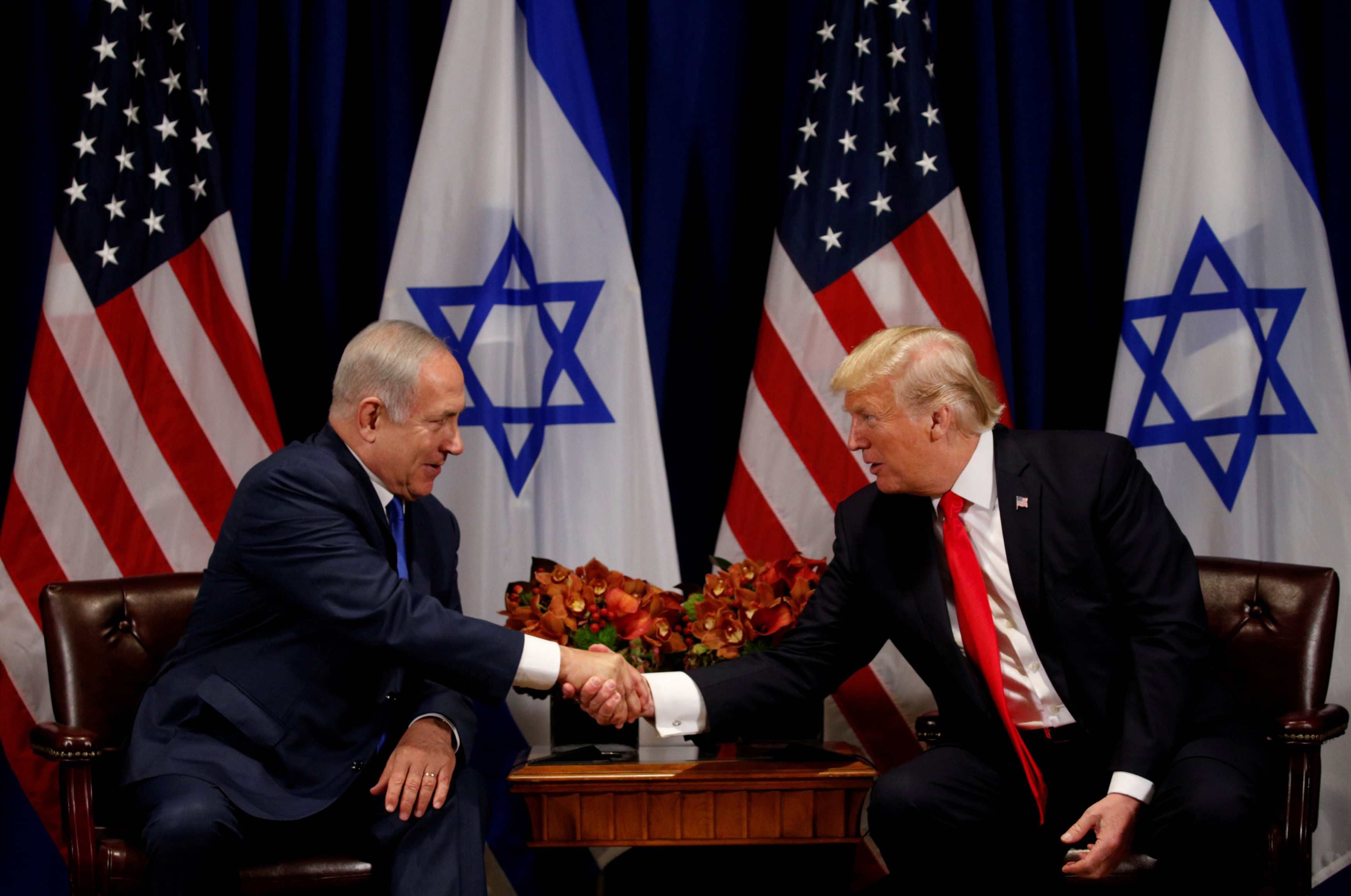
US President Donald Trump meets with Israeli Prime Minister Benjamin Netanyahu
in New York. /Reuters Photo
US President Donald Trump meets with Israeli Prime Minister Benjamin Netanyahu
in New York. /Reuters Photo
“Most people would say that there is no chance whatsoever. I think with the capability of Bibi - and frankly, the other side - I really think we have a chance," Trump was quoted as saying.
"History people say it can't happen - I say it can happen," he added.
Trump turned heads in February when he strayed away from a decades-old US commitment to uphold the two-state solution when he said he will be “very happy with the one (settlement) that both parties like,” in what observers said could spell trouble for the already lethargic talks.
Sisi also held talks with the Palestinian President Mahmoud Abbas in New York in a meeting that came on the heels of reconciliation between the two major but rival Palestinian factions – Fatah and Hamas – in which Cairo had a major hand in brokering.
Not a first?
Monday was not the first time Sisi and Netanyahu tackled the Middle East peace process. The two have met at least twice since Sisi took office in 2013 – however both times were secretive.
In February 2016, a summit between Arab leaders, including Sisi, King Abdullah II of Jordan, then US Secretary of State John Kerry and Netanyahu was held in Aqaba in Jordan to discuss a regional peace initiative. A month later, Netanyahu covertly flew to Cairo along with Israeli Leader of the Opposition Isaac Herzog for a few hours to meet Sisi and explore another regional deal. The clandestine gathering was only publicized in June this year by Israeli daily Haaretz.
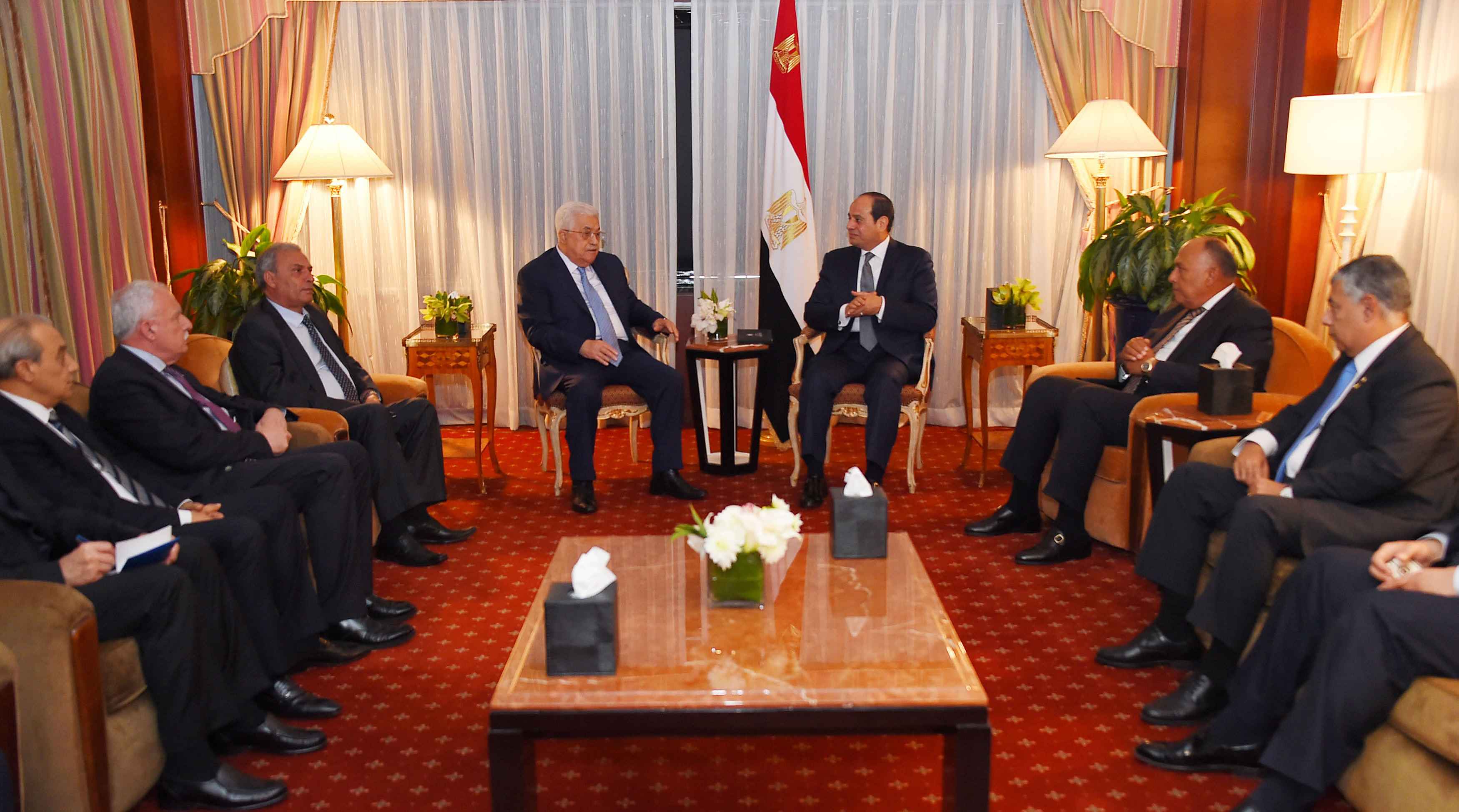
Egyptian President Abdel Fattah al-Sisi (3rd R) speaks with Palestinian
President Mahmoud Abbas (4th L) during their meeting in New York. /Egyptian Presidency Handout via Reuters
Egyptian President Abdel Fattah al-Sisi (3rd R) speaks with Palestinian
President Mahmoud Abbas (4th L) during their meeting in New York. /Egyptian Presidency Handout via Reuters
However, their latest meeting was on-the-record with analysts saying both Sisi and Netanyahu benefited from the photo-call.
Sisi’s backstory
While all roads lead to Rome, for Arab leaders the path to Washington necessarily goes through Israel. The Egyptian president’s decision to go open with his meeting with Netanyahu has been seen as an attempt to curry favor with the US administration, following recent twists in the once promising relation between Sisi and Trump.
“He did it to please President Trump and some senators who have become increasingly displeased with Sisi. He wants the photo-op and to renew the story of Egypt as the peace partner of Israel,” Michele Dunne, director and a senior fellow in Carnegie's Middle East Program, told The Media Line, a US non-profit news agency focused on Middle Eastern affairs.
Sisi and Trump hit it off in September last year when the latter was still on the campaign trail. At the time, he called the Egyptian president a “fantastic guy." Following the November election, Sisi was reportedly the first leader to telephone Trump and congratulate him on the victory.
The two met again in April this year in Washington and exchanged flattery: Trump lauded the “fantastic job” Sisi had done in cracking down on Islamists, while the Egyptian president described his US counterpart as having a “unique personality.”
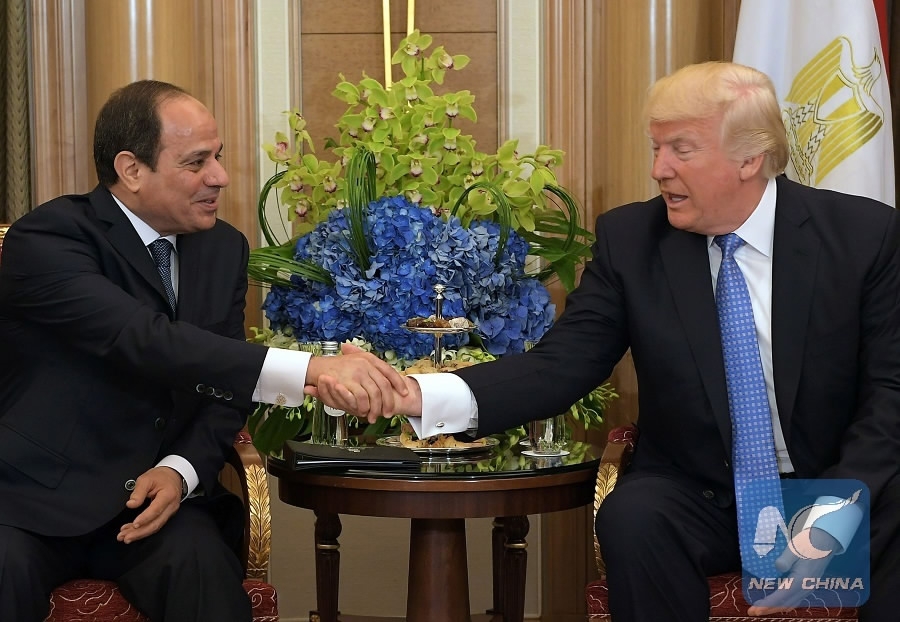
US President Donald Trump (R) and Egyptian President Abdel Fattah al-Sisi take part in a bilateral meeting at a hotel in Riyadh on May 21, 2017. /Xinhua Photo
US President Donald Trump (R) and Egyptian President Abdel Fattah al-Sisi take part in a bilateral meeting at a hotel in Riyadh on May 21, 2017. /Xinhua Photo
But things took a turn for the worse in August, when the Trump administration announced it was slashing around 100 million US dollars in military and economic assistance to Egypt and withholding nearly 200 million US dollars in military aid over human rights concern. Cairo attempted to hit back by scrapping a scheduled meeting between its Foreign Minister Sameh Shoukry and Trump’s son-in-law Kared Kushner, who was in Egypt as part of a tour to probe the possibility of reviving the stagnating peace talks between Israel and Palestine. Eventually, the meeting was pushed through and Shoukry was in attendance when Sisi held talks with Jared.
Sisi's efforts to ease the tension with Washington through bringing to the fore Egypt's position as an ally for Israel in forging peace has also led him to sit down with members of the Jewish American leaders on Monday, to whom he expressed belief in the US administration’s attempts to restore peace talks in the Middle East.
Netanyahu’s charm offensive
The Israeli prime minister also has plenty to prove when it comes to his country’s ties with neighboring nations.
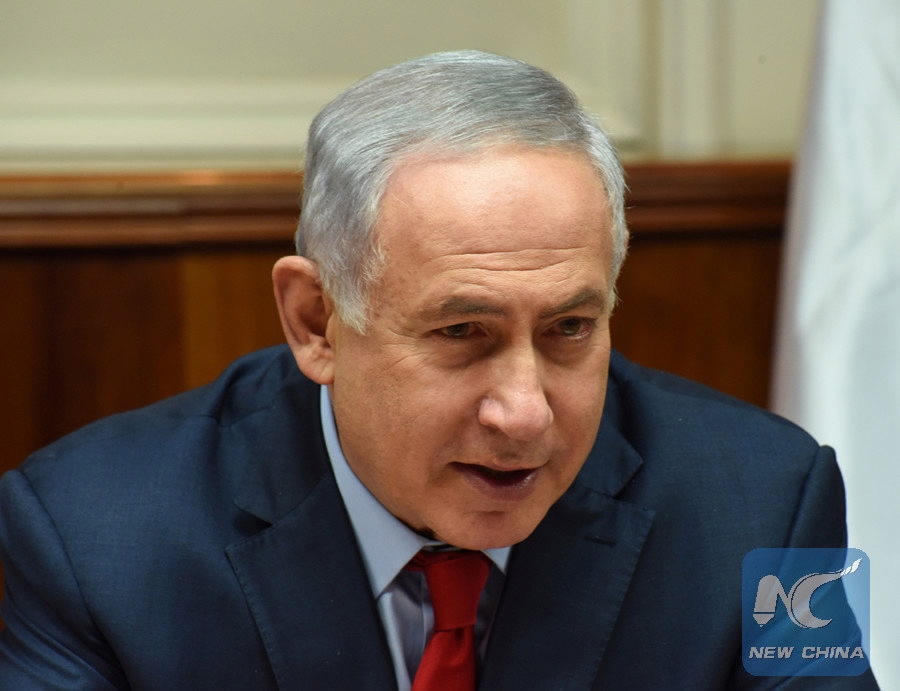
Israeli Prime Minister Benjamin Netanyahu speaks in his office in Jerusalem September 5, 2017. /Xinhua Photo
Israeli Prime Minister Benjamin Netanyahu speaks in his office in Jerusalem September 5, 2017. /Xinhua Photo
Hostility and enmity have long governed how Israel and Arab nations see each other following the Israeli occupation of the West Bank, Gaza Strip and Golan Heights and the subsequent Palestinian bloodshed.
Of the 22 member countries of the Arab league, only Egypt and Jordan have normalized diplomatic relations with Israel. In recent years, some Sunni nations have started to warm up to Israel behind closed doors, and at times in the open, to counter the increasing footprint of Iran – their regional arch-rival – in the Middle East.
Netanyahu believes that ties with Arab countries have climbed to a new high under his tenure, describing them earlier this month as the “best ever.” He also spoke of a “breakthrough” in bilateral relations despite the lack of progress in rapprochement with Palestinians, noting that cooperation exists "in various ways and (at) different levels" between his country and Arab states.
His public meeting with Sisi seems to play into his rhetoric of enhanced relations with Arab leaders.
Whether to explore ways to solve the Israeli-Palestinian dispute, enhance their public image, or both, the talks between Sisi and Netanyahu did not go unnoticed amid the flurry of meetings New York has been witnessing.

